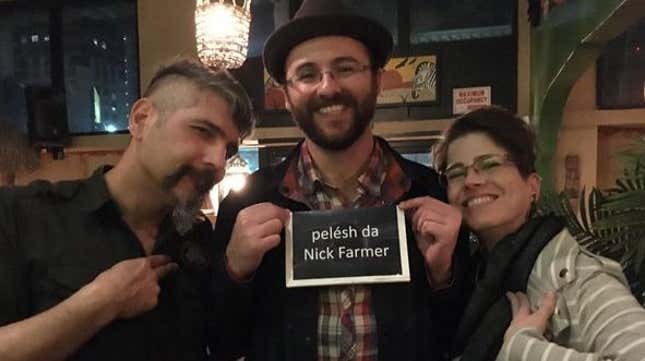If you’re a screenwriter imagining a fictional place, whether on Earth or in space, it’s become almost de rigueur to invest it with its own language. Valyrian, created by linguist David J. Peterson for Game of Thrones, is the best recent example.
Sometimes these languages can take on a life of their own, such as with Klingon. (Invented for the Star Trek film franchise, it is even the subject of a copyright battle over the right to speak and study it freely on Earth.)
So it is with The Expanse, a space thriller on the SyFy network set two centuries in the future, when tens of millions of humans have colonized the stretch of space from Mars to Saturn, especially the moons and asteroids among them (see this story). The working-class asteroid dwellers and the language they speak are both known as “Belter.” A creole created by Silicon Valley linguist Nick Farmer, Belter starts with an English substrate, and is infused with flashes of Chinese, Hebrew, Persian, and a host of other influences.
The show is based on the book series by James S.A. Corey, the pen name of Ty Franck and Daniel Abraham. When they and Expanse screenwriters started adapting the books, “everybody liked the idea that a polyglot language arose in the Belt,” Franck says. “It gave a sense of alienness in a show that doesn’t have aliens. It sets apart the Belters from the rest.”

As with Klingon, the science fiction subculture has transported the celestial language from the screen to their own communities here on Earth. One such locale is Longitude, a saloon in Oakland, California, whose barkeep—a man who goes by the name “Pirate” Baban—and his wife, Lexi Breed, may be the world’s most fluent speakers of Belter, aside from its creator and some members of the cast.
Baban said he and Breed picked up the language from the show and the internet, where Farmer tweets new words, and actors from the cast—and their fans—produce Vines demonstrating how to pronounce them. “Earth, Mars, and the asteroid belt have different cultures. I just thought the Belters are the coolest,” Baban said. Here is a Vine:
In winter, Expanse aficionados gathered at Longitude on occasional Wednesdays for ora xush (“happy hour”), and shared their Belter. Farmer would show up as long as he was poured daiquiris, and Baban conceived a rum-based concoction called naterash (“no thrust”). “In the belt, constant thrust is how they mimic gravity,” Baban explains. “Engines kick off, zero-g. One sip of this cocktail and you feel ready to float out of your seat. The rum is finished in a vacuum still, which felt appropriate.”
“Xelixup (excellent),” Baban added.
How Farmer happened to be invited to create Belter is one of those labyrinthine Hollywood coincidences that in this case began at Professor Thom’s, a bar on Second Avenue and 14th Street in New York City. In 2011, Farmer, then living in Manhattan, was frequenting Thom’s to watch the first season of Game of Thrones on a big screen. One night, he turned and noticed that sitting right next to him was none other than George RR Martin, the author of the books behind the series. In town to see his publishers, Martin, not quite yet the blockbuster best-selling household name he was soon to become, wanted to watch the show with a real audience.
Farmer started a conversation. Wanting to avoid looking like a star-struck fan, he mentioned knowing an organizer of Google Talks, the prestigious author series, and asked whether Martin was interested in speaking at the company’s Silicon Valley headquarters. (The contact was Farmer’s mom, Ann, who works at Google and is an organizer of the talks.) That summer, the talk took place, and Martin brought in tow his assistant—Ty Franck, who had just published Leviathan Wakes.
One thing led to another, and Farmer spent three months creating a grammatical structure for the population of Belters. (Here is Farmer discussing the language.)
The Belters curse quite a bit, and as a warning if you happen to be at Longitude, watch out if anyone calls you dzemang. It means crooked penis and, says Farmer, “is definitely something you don’t want to be called in the Belt.”
